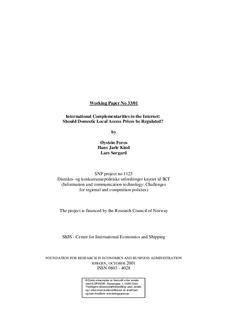| dc.description.abstract | The Internet can be seen as the convergence of different industries like telecommunication, software, and media into an international oligopoly, where the end-user is offered a bundle consisting of complementary products such as access to local and global networks, software, and content. For instance, in order to get tied up to the global Internet the end-users must be connected to the local telephone network through an Internet Service Provider (ISP). The ISP in turn provides access to different contents and applications on the Internet through regional and global backbone providers. The Internet is thus often described as the joint supply of a number of complementary inputs. Several of these inputs are provided by dominant firms (i.e., firms with significant market power). Except for the domestic telecommunication incumbent, who typically controls the local access component, most of the firms with market power in the Internet sector are US-based. Last, but not least, there is a striking asymmetry concerning regulatory policy. While domestic providers of local access have faced a restrictive regulatory regime, few other dominant firms in the Internet industry have been regulated. This raises the question: Will a restrictive regulation of local access still make sense? We find that in some cases no regulation is the optimal regulation, but that the optimal policy depends crucially on characteristics of the industry, such as the vertical structure and the degree of product differentiation, and the parties’ ability to commit themselves. In particular, we show that ? Regulation of local access prices may be detrimental to welfare unless the regulator is able to credibly commit itself to a certain regulation policy. ? Regulation is likely to be particularly harmful if there is fierce price competition in the retail ISP market. ? The regulated price on local access should in general be set higher than long-run marginal costs. | en |
